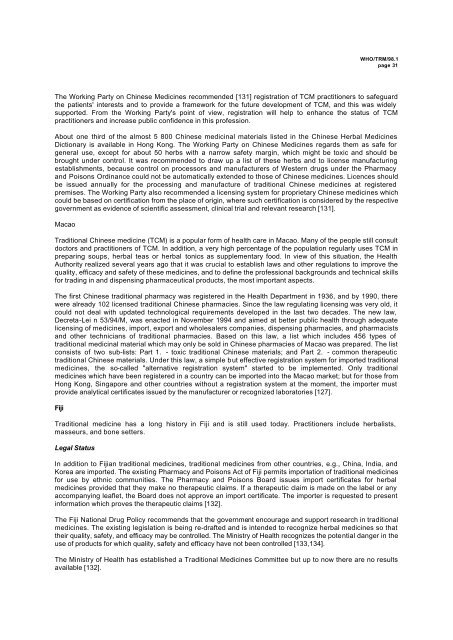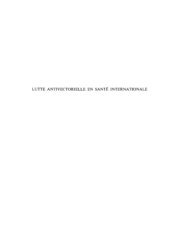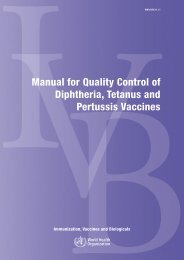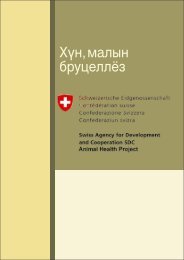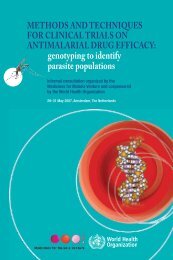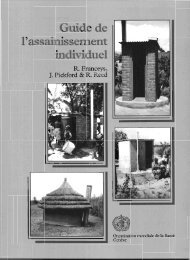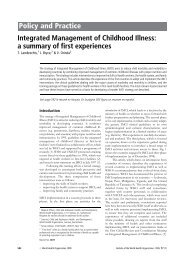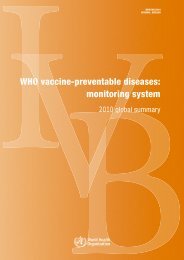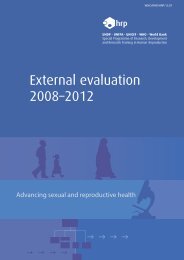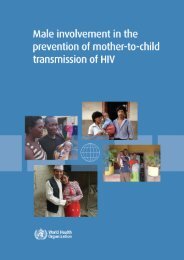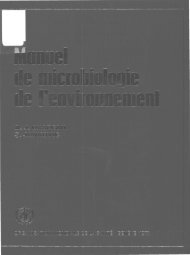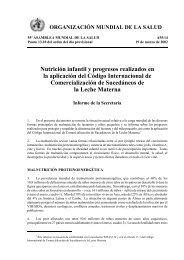Regulatory Situation of Herbal Medicines A worldwide Review
Regulatory Situation of Herbal Medicines A worldwide Review
Regulatory Situation of Herbal Medicines A worldwide Review
You also want an ePaper? Increase the reach of your titles
YUMPU automatically turns print PDFs into web optimized ePapers that Google loves.
WHO/TRM/98.1page 31The Working Party on Chinese <strong>Medicines</strong> recommended [131] registration <strong>of</strong> TCM practitioners to safeguardthe patients' interests and to provide a framework for the future development <strong>of</strong> TCM, and this was widelysupported. From the Working Party's point <strong>of</strong> view, registration will help to enhance the status <strong>of</strong> TCMpractitioners and increase public confidence in this pr<strong>of</strong>ession.About one third <strong>of</strong> the almost 5 800 Chinese medicinal materials listed in the Chinese <strong>Herbal</strong> <strong>Medicines</strong>Dictionary is available in Hong Kong. The Working Party on Chinese <strong>Medicines</strong> regards them as safe forgeneral use, except for about 50 herbs with a narrow safety margin, which might be toxic and should bebrought under control. It was recommended to draw up a list <strong>of</strong> these herbs and to license manufacturingestablishments, because control on processors and manufacturers <strong>of</strong> Western drugs under the Pharmacyand Poisons Ordinance could not be automatically extended to those <strong>of</strong> Chinese medicines. Licences shouldbe issued annually for the processing and manufacture <strong>of</strong> traditional Chinese medicines at registeredpremises. The Working Party also recommended a licensing system for proprietary Chinese medicines whichcould be based on certification from the place <strong>of</strong> origin, where such certification is considered by the respectivegovernment as evidence <strong>of</strong> scientific assessment, clinical trial and relevant research [131].MacaoTraditional Chinese medicine (TCM) is a popular form <strong>of</strong> health care in Macao. Many <strong>of</strong> the people still consultdoctors and practitioners <strong>of</strong> TCM. In addition, a very high percentage <strong>of</strong> the population regularly uses TCM inpreparing soups, herbal teas or herbal tonics as supplementary food. In view <strong>of</strong> this situation, the HealthAuthority realized several years ago that it was crucial to establish laws and other regulations to improve thequality, efficacy and safety <strong>of</strong> these medicines, and to define the pr<strong>of</strong>essional backgrounds and technical skillsfor trading in and dispensing pharmaceutical products, the most important aspects.The first Chinese traditional pharmacy was registered in the Health Department in 1936, and by 1990, therewere already 102 licensed traditional Chinese pharmacies. Since the law regulating licensing was very old, itcould not deal with updated technological requirements developed in the last two decades. The new law,Decreta-Lei n 53/94/M, was enacted in November 1994 and aimed at better public health through adequatelicensing <strong>of</strong> medicines, import, export and wholesalers companies, dispensing pharmacies, and pharmacistsand other technicians <strong>of</strong> traditional pharmacies. Based on this law, a list which includes 456 types <strong>of</strong>traditional medicinal material which may only be sold in Chinese pharmacies <strong>of</strong> Macao was prepared. The listconsists <strong>of</strong> two sub-lists: Part 1. - toxic traditional Chinese materials; and Part 2. - common therapeutictraditional Chinese materials. Under this law, a simple but effective registration system for imported traditionalmedicines, the so-called "alternative registration system" started to be implemented. Only traditionalmedicines which have been registered in a country can be imported into the Macao market; but for those fromHong Kong, Singapore and other countries without a registration system at the moment, the importer mustprovide analytical certificates issued by the manufacturer or recognized laboratories [127].FijiTraditional medicine has a long history in Fiji and is still used today. Practitioners include herbalists,masseurs, and bone setters.Legal StatusIn addition to Fijian traditional medicines, traditional medicines from other countries, e.g., China, India, andKorea are imported. The existing Pharmacy and Poisons Act <strong>of</strong> Fiji permits importation <strong>of</strong> traditional medicinesfor use by ethnic communities. The Pharmacy and Poisons Board issues import certificates for herbalmedicines provided that they make no therapeutic claims. If a therapeutic claim is made on the label or anyaccompanying leaflet, the Board does not approve an import certificate. The importer is requested to presentinformation which proves the therapeutic claims [132].The Fiji National Drug Policy recommends that the government encourage and support research in traditionalmedicines. The existing legislation is being re-drafted and is intended to recognize herbal medicines so thattheir quality, safety, and efficacy may be controlled. The Ministry <strong>of</strong> Health recognizes the potential danger in theuse <strong>of</strong> products for which quality, safety and efficacy have not been controlled [133,134].The Ministry <strong>of</strong> Health has established a Traditional <strong>Medicines</strong> Committee but up to now there are no resultsavailable [132].


